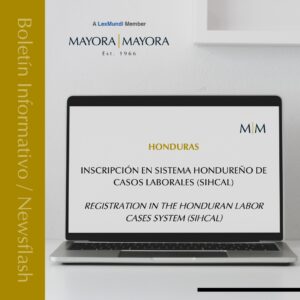When drafting a contract, whether international or local, drafters –lawyers, consultants and clients– often do not give much importance to the clauses on choice of law and choice of forum for resolution of disputes that may arise from the contractual relationship. Generally, contracting parties are more concerned with the subject matter of the contract, without considering the potential implications of an erroneous selection of the applicable law at the time of performance, and of the forum for dispute resolution in the event of a dispute between the parties.
This article does not intend to resolve the issue, but rather to present certain considerations I deem indispensable when selecting the applicable law and the forum for dispute resolution, a selection that can have important repercussions for the parties.
Choice of law refers to the voluntary submission of the contracting parties to a certain law, namely, the law of a country, a state, a territorial district or international treaty, which the contracting parties, by mutual agreement, have selected as the law to be applied for the interpretation and performance of the contract. Forum selection refers to the voluntary submission of the contracting parties to have their disputes resolved by the courts of a particular nation, or in an arbitration proceeding.
Guatemalan legislation, like most, regulates private international law. In Guatemala it is regulated in the Judiciary Act and in the Code of Private International Law (Bustamante Code), an international treaty subscribed by several countries of the Americas.
The Judiciary Act establishes in Article 31 that legal acts are governed by the law to which the parties have submitted, unless such submission is contrary to expressly prohibitive statutes or public order. This implies that, except in cases in which Guatemalan law establishes that a certain situation cannot be subject to the law of another country, the contracting parties have absolute freedom to agree that the contract they enter be subject to Guatemalan law or to foreign law. In what cases is it impossible to agree to be subject to foreign law? For example, in matters of labor, family, criminal, local corporations, property, among others, in which laws are territorial, i.e., only the law of the place where such right is intended to be enforced can be applied, i.e., the place where a commercial company was incorporated, where the labor relationship arose, where the goods are located, etc.
Additionally, the Judiciary Act establishes that Guatemalan courts are competent to summon foreign or Guatemalan persons who are outside the country, in the case of legal acts in which parties have submitted to the jurisdiction of Guatemalan courts (Article 34). This means that any person, national or foreign, may agree that the courts of Guatemala have jurisdiction to hear disputes arising between them from a contractual relationship, provided that such submission is by mutual agreement.
For example: The law of the State of New York (New York General Obligations Law) allows a foreign contract to be subject to the law of that State if its amount (the value of the obligations assumed therein) is greater than US$.250,000.00. To be subject to the courts of such State, the amount must be greater than US$.1,000,000,000.00. In other words, the law of New York allows a contract that has no relation with such State to be submitted to its courts of justice and its law.
On the other hand, the Organic Law of the Judiciary of the Kingdom of Spain, unlike Guatemalan law, requires that there be a point of connection between the contract and Spain, i.e., that the obligation be performed in Spain, that the damage was caused in Spain, that one of the contracting parties resides in Spain, or other conditions.
Of the three examples cited, Guatemala is the most flexible, since it does not require a point of connection with the country and does not establish an amount, while New York does not require a point of connection, but does require a minimum amount, and Spain requires a point of connection.
The following are some aspects to be considered when drafting the respective clauses.
Contractual considerations
When selecting law and forum, certain aspects of the contract should be considered, such as:
- The legal nature of the contract, i.e., whether it is a purchase and sale, distribution, supply, shareholders’ agreement, trademark license, etc. This makes it possible to determine whether there are specific rules or public policy rules limiting the choice of law or forum, as well as the convenience of a certain law or a certain forum.
- The obligations of each contracting party and the risk of non-compliance. This can be used to determine whether submission to a certain law or forum is convenient in terms of efficiency in enforcing rights.
- The place of performance of each obligation and the location of the assets subject to the contract, if any. This allows to assess whether there are limitations to subject it to foreign law depending on the obligations and goods, and whether there are specific protections by the law of the country of its location or performance. For example, a sale of real estate, by law, must be processed in Guatemala under Guatemalan law since it is a property located in the country.
- The remedies that the contracting parties would demand in case of breach, such as seizure of goods, intervention of a business, forced performance, etc. It is important to consider whether the laws of a country grant protections to foreigners on such assets, the agility in granting them and the real effectiveness of obtaining precautionary measures.
- The amount of the contract allows determining whether it complies with legal requirements, whether the dispute is arbitrable or should be submitted to specific courts, as well as the convenience of subjecting a contract to foreign law or to a certain procedure. For example, it would not be advisable to submit a contract for Q.10,000.00 to arbitration and foreign law, even if the counterparty is foreign, but it could be convenient to do so with a contract for Q.1,000,000.00.
Non-contractual considerations
It is also important to consider certain extra-contractual aspects, i.e., circumstances that are relevant for purposes of choice of law and choice of forum, even if they are not directly related to the contract, such as:
- The nationality and residence of the contracting parties in many cases may define the applicable law. For example, when the nationality is a connecting point for a law that requires it, as in the case of Spanish law.
- The capacity of the contracting parties to perform, i.e., whether they have the resources to meet the obligations assumed and to be liable for possible breaches.
- The location of the goods that are the object of the contract, including those of each contracting party. This determines whether there is a limitation to submit to another law or to enforce certain rights with respect to the goods, as well as the location of the goods for a possible breach.
- How hostile a law is to foreigners, i.e., whether it is protectionist for nationals or impartial. Submitting to legislation or courts that tend to protect nationals puts a foreign contracting party at a disadvantage. The same is true of courts of law or arbitration centers: if they tend to protect their nationals, that is a decisive factor in the selection of law and forum.
- The efficiency of each country to enforce laws and a contract, as well as to execute precautionary measures. The effectiveness of the courts is critical in the event of a breach of contract.
- The efficiency of each country to enforce foreign awards or judgments. A foreign award or judgment must be homologated before a competent court to be enforceable in another country.
- The existence of prohibitive laws that limit or exclude the choice of law and forum. There are certain situations in which, by legal mandate, it is prohibited to submit to another law, as in the matters mentioned above.
Arbitration or courts?
Another relevant issue when discussing the choice of law and forum is whether it is advisable to submit to courts of law or to arbitration. The choice of forum does not only refer to a country, but also to the procedure for resolving disputes. Therefore, it is necessary to consider the following aspects.
Judicial procedures
Judicial procedures tend to be much slower. Judicial delay tends to be high in Guatemala and other countries. This implies that the dispute is not resolved expeditiously, as the contracting parties would expect, but may even take years. Resorting to the courts also entails the disadvantage that judges are not experts in all areas of law, and even less so in complex issues involved in a contractual relationship. As in Guatemala, in several countries judges tend to specialize in common law and in very few cases in specific issues, such as finance, trademarks, etc. This implies the risk that a complex case may not be resolved in the best way, due to the judge’s lack of knowledge.
But court proceedings also have advantages. The first is that they are free of charge because of the right of access to justice, which is universal and free, that is, everyone has the right to access the courts of justice without having to pay to have their disputes heard by a judge. Another advantage is that being vested with authority, judges can issue orders and enforceable precautionary measures without the need for assistance from another authority, unlike the arbitration procedure that requires judicial intervention.
Arbitration proceedings
Legislation has created alternatives to judicial procedures for the settlement of disputes, such as conciliation, mediation and arbitration. An arbitration procedure is an out-of-court procedure whereby the settlement of a dispute is entrusted to private persons, resulting in a decision called an award that is binding on the parties.
The selection of an arbitration procedure involves several considerations, including:
- Arbitral center that will administer the arbitration. Generally, arbitrations are administered by a private entity whose purpose is to conduct such proceedings. In some cases, the parties choose not to submit the dispute to an arbitration center, but to conduct the arbitration themselves in accordance with the arbitration laws (ad hoc arbitration). In Guatemala there are two main arbitration centers: the Arbitration and Conciliation Center of the Guatemalan Chamber of Commerce (CENAC) and the Dispute Resolution Commission of the Guatemalan Chamber of Industry (CRECIG). At the international level, each country usually has arbitration centers. There are also renowned international arbitration centers, such as the International Centre for Dispute Resolution (ICDR), the International Chamber of Commerce (ICC), among others.
- Procedural rules for the arbitration process. The rules governing the arbitration proceedings are usually drawn up by the selected arbitration center. In this case, it is important that the drafters of the contract are clear about the rules contained in the selected regulation. The selection of the rules should not be made lightly, but with knowledge of their content and efficiency, the procedures for substantiating evidence, challenges, etc. Choosing arbitration rules without being clear about their content may cause the procedure to be carried out in a way that is inefficient for the parties or to their detriment. In Guatemala, if the parties so choose, they may submit to the Arbitration Act, to be processed through the procedure established in law.
- Arbitrators. The parties may agree on the number of arbitrators to hear the case, usually one or three. In general, the number of arbitrators will depend on the amount in dispute. The parties may agree on the procedure for selecting the arbitrators, their nationality and other requirements. The nationality of the arbitrators is usually not considered, but it is highly advisable to consider arbitrators related to the nationality of the parties. This is because an arbitrator who is akin to the nationality of the contracting parties will have knowledge of relevant idiosyncrasies, culture, legal principles, etc. For example, in a dispute between a contracting party from a country whose law is of common law tradition (Australia) and another of continental or civil law tradition (Spain), where the obligations must be performed in Spain, the Spanish contracting party could be at a disadvantage if all the arbitrators are of common law. In such a case, the arbitrators would not have adequate knowledge of how business is done in Spain nor of the local law, to apply it on a supplementary basis if necessary.
- Language of arbitration. For international arbitrations in which the parties are from different countries, it is advisable to agree in advance on the language in which the arbitration will be conducted.
- Type of arbitration. There are two types of arbitration: arbitration at law, which is settled in accordance with the law; and arbitration in equity, which is settled to the best knowledge and belief of the arbitrators, who may not be legal specialists.
As can be seen, the selection of an arbitration procedure for the settlement of disputes turns out to be complex. Several aspects must be considered which, if wrongly evaluated, could bring about adverse results for the parties. In this regard, it is important that the drafter of the contract is clear about the needs of the parties and that they are clear about the implications of their selection, so as not to later claim ignorance of the procedure to which they have submitted.
One or the other?
There is no single answer to the question of when to choose between arbitration and court proceedings, as it will depend on each case. However, it is possible to offer some guiding considerations:
- The complexity of the contract. A contract for the purchase and sale of machinery is not the same as a syndicated loan with international banks and complex clauses. A judge will probably have the capacity to hear the purchase and sale, but not the syndicated loan with complex clauses for the fixing of the SOFR interest rate and financial conditions.
- Confidentiality of the dispute. In general, judicial proceedings are public and accessible to anyone. There are virtual platforms that publish judgments or even all the proceedings, such as www.iuristec.com.gt, where Guatemalan judgments are published, or www.jusmundi.com, which publishes many judicial proceedings processed in the United States. In this sense, if the contracting parties want the dispute to be handled confidentially, arbitration is probably the solution, since it is only known to the parties and its confidentiality can even be agreed. However, confidentiality alone should not be a decisive factor.
- Procedure. Arbitration proceedings are handled privately in a voluntary procedure and, if the applicable rules allow it, the parties will have the flexibility to define a timetable for its development. This does not apply in judicial proceedings, which are processed in accordance with the law, without the possibility of agreeing contrary to what the law stipulates.
- Expeditiousness. It is common to think that arbitrations are much more expeditious than a judicial proceeding, but this is not always the case. Although arbitrations should be more expeditious, there are cases in which they can take much longer than stipulated. The delay may commonly be due to factors such as the complexity of the case or the availability of the arbitrators, who are often professionals who are not full-time arbitrators. On the other hand, court proceedings may or may not be expeditious, depending on the country. In general, however, arbitration is faster than court proceedings.
- Cost. Arbitration represents a high cost for each of the parties, as opposed to a judicial proceeding, which is free in terms of the administration of justice, but not in terms of fees of attorneys and experts, etc. This is usually a decisive factor for the contracting parties, especially those who would be at greater risk of default.
- Enforcement. It may be considered that, once the judgment or award has been issued, its enforcement is immediately mandatory. However, although the judgment and the award are binding and mandatory, it is always possible that the losing party may resist enforcement. In the case of a final (unappealable) judgment, the judge may be requested to enforce it, issuing orders and with the help of public force in case of resistance. In the case of awards, once they are final, they must be homologated before a court to be enforced. In other words, to enforce arbitral awards, there is always an additional step that must be followed involving the judicial system.
Conclusion
Drafting a choice of law and forum selection clause is not simple and should not be taken lightly. Contracting parties and their counsel must be careful to make the best selection. A legal advisor cannot give adequate recommendations if the client does not provide the necessary information regarding factors such as concern of default, the counterparty’s ability to pay or perform, possible remedies it would be willing to provide in the event of default, among others.
A clause of this nature could be decisive not only in the event of a possible default, but even as a deterrent. If the clause is not clear or the procedure selected is not efficient, the defaulting party could take advantage of it to avoid assuming liability. On the other hand, if the clause is robust, the breaching party may consider that it is better to settle the breach before initiating a dispute resolution procedure.
Investing in a well-drafted forum selection clause, along with the proper choice of law, will make all the difference in a contract. The contract may have all the contractual protections (interest, penalties, withholding, indemnities, etc.), but, if the forum clause is deficient, they will have little effect. In this sense, it is recommended to take the necessary time to understand the scope of these clauses and to achieve, as far as possible, a correct drafting.
Carlos Ortega





